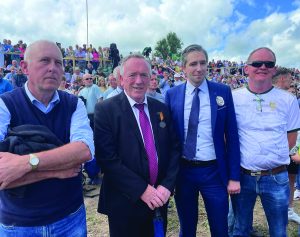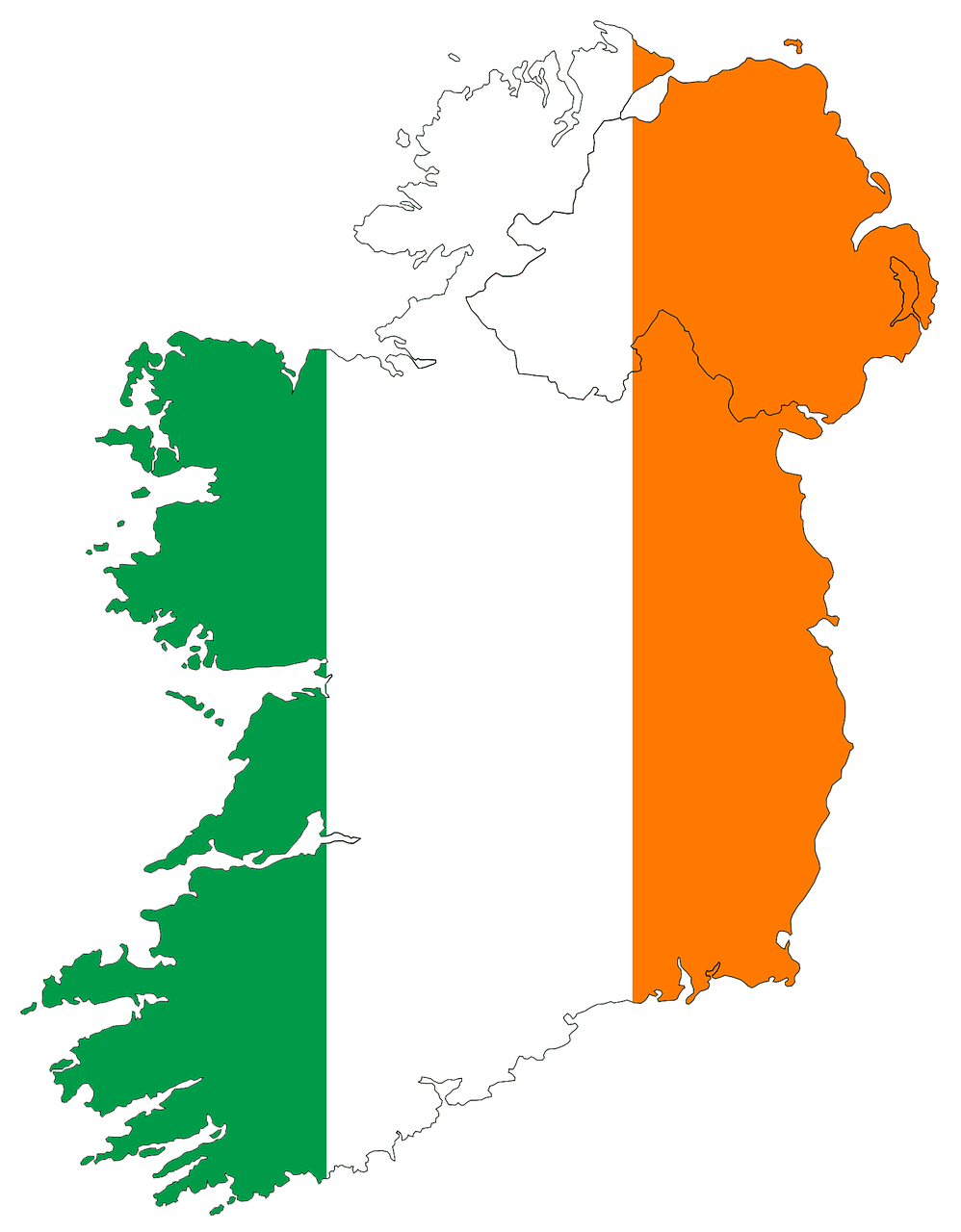
In a historic departure to mark the special anniversary, the annual commemoration of Michael Collins’ assassination at Béal na Bláth saw men from two different political traditions, Taoiseach Micheál Martin T.D. and Tánaiste Leo Varadkar T.D. stand side by side to honour and recall the legacy of Collins in two well-crafted orations.
Record crowds in excess of the anticipated 5,000 made their way to the west Cork site where Michael Collins fell on 22nd. August 1922.
Traditionally a Fine Gael event, on Sunday Taoiseach and Tánaiste by their presence together at the historic site expedited the reconciliation of the sides who were bitter enemies in the Civil War in which Collins laid down his life.
In his oration, Taoiseach Micheál Martin T.D. said “This commemoration is an important statement of remembrance and gratitude. It is a mark of our respect for one of the great heroes of Irish history, a man who played an irreplaceable role in securing Irish freedom. For the political tradition represented by Fine Gael this has long been a place to meet together and to remember a leader who has always provided a special inspiration for them.
“However, it is also an important site for all who honour and respect our independence struggle and our democracy. It is one of the greatest achievements of the last century that different democratic traditions have worked hard to show respect and develop a new understanding of each other
“And we should acknowledge the special role which the Collins family and the Commemoration Committee have played in this over many decades.
“Fifty years ago their work led one of my predecessors, Jack Lynch, to designate the Collins homestead as a national monument and to take it into the care of the State. At the same time the Fianna Fáil Minister for Defence Jerry Cronin accepted an invitation to attend this commemoration and laid a wreath on behalf of the government. The invitation to my late colleague Brian Lenihan to speak here twelve years ago marked another important moment.
“These and many other generous and open gestures have helped ensure that democratic Irish nationalism has found so much common ground in looking back at our history and the role of our founders in winning independence.
“While we all know the outlines of his story and his impact, we should do far more to understand and recognise the brilliance of his service to his country. A former colleague wrote of him: ‘Tall, dark, handsome and strongly built, he had all the dash, initiative, and devilment that fitted him for the role of a great guerrilla warrior. His ability in the handling of finance, as well as his power of speech, were exceptional for a man of his age and education. But that characteristic which stood him in good stead under all conditions was his sense of humour.”
“Witnessing this, no one could argue with the fact that the Irish people were ready to control their own future. Collins was a sincere advocate for the Treaty and he was just as committed to trying to prevent the drift towards civil war.
“A new generation of historians has looked at the fateful events which led to the civil war using a range of sources never before available. Their work challenges us to look again, and especially to appreciate just how many efforts were made to bridge the gap between opponents.
“He did not demonise others because he remembered all he had gone through with them as colleagues and friends. He never celebrated deaths of opponents and showed deep compassion – openly weeping when he heard of the deaths of former colleagues like Cathal Brugha.
“It is perhaps the greatest tragedy of Collins’ death that it deprived us of our best hope for reconciliation. The bitterness which grew out of the events of the following year showed how much was lost in this place.
“We should also do more to remember Collins’ relentless work to try to protect Northern nationalists and his opposition to the partition of our country which had been imposed in 1920.
“Collins always had a sense of the bigger picture of our complex society and the challenge of bringing it together. When we look back over what has been achieved in the last century I have no doubt that Collins would see a country transformed – an Irish state which has proved to the world that it can achieve great things when it is free to shape its own destiny.
Concluding, An Taoiseach said, “In his short 31 years Michael Collins made a deep, lasting and positive impact on our country. Shaped by the ideals of his community, he devoted his life to his country.
“He was a dynamic leader who could both inspire people and, in the middle of a bloody conflict, build a new administration from nothing.
“He is a key reason why we have been able to build a country which, while it still faces major challenges, has been transformed for the better.
“For this, today, as much as ever before, he deserves our gratitude and he deserves to be remembered as one of the greatest Irishmen to have ever lived.”
In his oration, An Tanáiste Leo Varadkar T.D. said: “This is a painful site of memory for so many connected with Michael Collins. It is a place of death, forever associated with a senseless killing in an unnecessary war in which brother turned on brother. It is fitting that we gather here and remember, because what happened here one hundred years ago changed the course of Irish history.
“For me Collins was the great prophet of freedom who was killed before we reached the promised land. That was the great tragedy of Béal na Bláth, and the curse of the Civil War. By commemorating his death each year, we remember his sacrifice and make an act of faith in the Ireland he and the revolutionary generation wanted to achieve.
“Twelve years ago, my constituency colleague, Brian Lenihan, made history here in giving the oration. In becoming the first Fianna Fáil Minister to speak here, he knew that he was performing a ‘public act of historical reconciliation’, to use his words.
“Today we make history of a different kind with two orations, one each by the Taoiseach and Tánaiste of the day, the leaders of the two political parties which emerged out of the civil war, and which for too long were divided by mutual antagonism.
“Civil wars, by their very nature, leave a bitterness which it can take a very long time to heal, whether in Ireland, Spain, the United States or Greece. Undoubtedly the Irish Civil War was such a conflict and left a painful legacy which stunted our development in the years that followed.
“It was only with the wider European vision of statesmen- like Seán Lemass and Garret FitzGerald that we truly opened up to the world. We finally began to fulfil the promise that Collins had identified and allowed our light to shine. His faith in our future affirmed.
“Dear friends, colleagues, civil war politics ended a long time ago in Ireland, but it only ended in our Dáil when we formed the historic three-party coalition of Fine Gael, Fianna Fáil and the Green Party in June 2020.
“It is a partnership government, a government of equals, which has worked well, despite our different identities and traditions, because we have made its guiding focus finding solutions to the crises that affect our country, the international order, and indeed our planet.
“Allow me to thank the Taoiseach for accepting today’s invitation, and for the leadership and dedication he has shown over the past two years, and also for keeping a portrait of Cork’s greatest son on the wall of his office.
“He was both an idealist and a realist. And as he predicted, the Treaty gave us freedom and the freedom to achieve more freedom in the future.
“Collins’ legacy was great; it contains multitudes. Unlike others, whose defining idea was the achievement of the Republic, who found themselves unable to compromise to bring it into existence, Collins viewed freedom in a different way. He saw it as something that was more than simply a description. To have real meaning, it had to be felt and experienced and lived.
“I believe Michael Collins never intended his legacy to be the last word on Irish freedom. Instead, he gave us the freedom and opportunity to find our own path to it.
“On the centenary of his death, we pay tribute on behalf of a grateful nation and join together in this place to say, ‘Thank you’. Michael Collins’ life was Ireland and his legacy is Ireland too,” he concluded.
Huge turnout to mark centenary of the assassination of Michael Collins
August 25, 2022
Featured Stories, Home Slider, Weekly Observer





